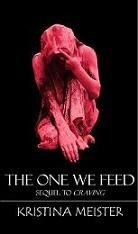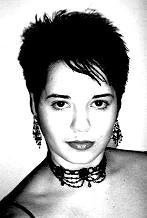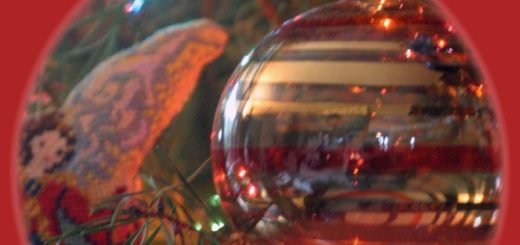Featured Indie Author of Speculative Fiction: Kristina Meister
 This week’s Featured Indie Author is speculative fiction author, Kristina Meister. Her work is tinged with horror, science, and mythology and crosses boundaries to make us think.
This week’s Featured Indie Author is speculative fiction author, Kristina Meister. Her work is tinged with horror, science, and mythology and crosses boundaries to make us think.
***
Kristina, Thanks for agreeing to be interviewed for the Writer’s Fun Zone and be this week’s Featured Indie Author. What can you tell us about your current title?
The hardest and most unnerving phase of my projects is talking about them. I consider myself a hermit who produces, and am comically and notoriously horrible at summarizing.
I love to play with genre and blend, or start a book in one genre or “feel” and evolve it into another, so it is very difficult for me to describe anything that I write. I can’t just say, “Well, it’s like this, but with elements of that,” because that, frankly, isn’t helpful to a potential reader.
That being said, my current trilogy follows a woman named Lilith on her journey toward becoming the harbinger of the apocalypse. In this trilogy, I blend Hindu and Judeo-Christian mythology with real science, monsters, racism, death, and a good old dose of creative cussing.
The first book, Craving, currently available on many ebook sites including Kindle, follows Lilith as she attempts to solve the mystery of her sister’s mysterious suicide. The second book, The One We Feed, is the story of Lilith’s acceptance of her role in the oncoming evolution of humanity. And the third book, A Handful of Seeds, on which I am currently working, will be the end of the world as we know it.
But all that’s a fancy way of saying there’s “magical powers” “immortal races” and “shape shifters”, and Lilith is “destined” to command them.
Intriguing! What inspired you to write the book?
It started with a dream of a funeral. The mourner at the funeral was so clearly rendered by my subconscious, which incidentally, does a lot of my writing for me, that I had to write a single scene. I did, though I had nothing to attach it to and no plot to accompany it. Several years later, I sat down and read it, and a plot just came to me. This plot needed time, education, and experience to develop, and all those ideas floating around in my head just attached themselves to that funeral scene, forming the plot of the first book. The mourner became Lilith.
Dreams are powerful! Who do you imagine is your ideal reader?
Anyone who likes to think. I like to challenge people to “meta-think” or think about how they think, be objective and skeptical of their own brains. To me this is an essential skill that makes life just that much easier. I am also a hardcore geek, so anyone who plays World Of Warcraft, watches Star Trek, knows where the line, “Swords don’t run out of ammo” came from, or understands the momentous achievement that is Robot Chicken, should feel right at home reading my stuff. I don’t target genders, ages, or specific groups. I love to blur lines.
That’s clear! What was your journey as a writer?
When I was a kid, I’d write short stories. I have notebooks full of partial conversations, scenes, and even just descriptions of characters or worlds (not necessarily any good). I never really thought about turning writing into a career. I was just a fan, reading and doing fan-ish things.
Then I went to college and discovered that I loved language. I loved the power it had, and what possessing that power did to actually change how we think.
I wrote my first complete book (not available because I’m a much better writer now and am slowly rewriting it) when I was a junior in college. Every year after that, I wrote another book, but I never did anything with them, because I still just saw it as a hobby.
Writers were like aliens to me. I was not one of them, I just liked what they did. It wasn’t until my husband read one of my books, then rapidly picked up the next, then the next, that I learned I had actually made something other people might like.
He encouraged me to seek representation, but I just thought he was biased. Then he bragged, and other friends and family started asking me for copies and giving me their feedback.
After a lot of cajoling, I went to the San Francisco Writers Conference, feeling like a fool out of her league. I had a conversation with an amazing person named Kevin Smokler about my work, who then introduced me to Laurie McLean, who is, I am proud to say, now my agent.
Now I feel like a writer, and every time I sit down to work, I see that the bar has been raised. I have an audience, and with each project, I improve because of it. The audience is what makes the writer, I think.
Every author’s journey is unique and interesting, I think! What is your writing process?
Surprisingly, many of my stories begin as dreams that I have. I wake up and take notes. Over the course of weeks or months, I think about how to make the ephemeral into a real, tangible plot. Then I just start writing. I write one scene, then I think about where it will go next. Sometimes it takes me months to get one scene just the way I like it in my thoughts. Then I sit down, plug myself into my sound-blocking headphones, and it pours out.
Which brings up music. I need a soundtrack. I’ll lock myself in a room and listen to one song on repeat four hours as I write one chapter.
And finally, I edit as I go. If I have finally gotten chapter five exactly as I want it, I reread chapters one through four first. By the time I have finished a work, every chapter has been looked at at least 30 times. Then the final product is edited several more, by me and other readers I trust, including my agent, Laurie McLean.
I use a soundtrack on repeat, too. What authors most inspire you?
I prefer works with a greater purpose. Sure, fiction is a type of entertainment, but that isn’t all it is. We are responsible for reflecting on the world. Fiction is commentary; otherwise, our fantasies of what life could be like would be reality. (For a greater diatribe on this, watch the film “The invention of Lying”). We are not just record keepers. We are a force for change. Books that capture this while still managing to be entertaining, that make you cry, laugh, and think. Those are the kind of stories I live for.
I so agree! What one book, written by someone else, do you wish you’d written yourself?
Non-fiction: Godel, Escher, Bach by Douglas Hofstadter. This book is a profound piece of work, a humanist education between covers. If you read this book and don’t go into a zen state, you’re a robot.
Fiction: One of the greatest science fiction books ever written and certainly a classic, A Star is My Destination by Alfred Bestor, a retelling of The Count of Monte Cristo that still manages to innovate. This book encapsulates all that science fiction can be, using possibilities to comment on problems currently faced by society, like racism and classicism. And the ending has such a powerful message to it, that every time I read it, I am inspired.
Thanks for sharing about Bestor’s book. I’m curious to check it out now. How have you marketed and promoted your work?
That is an ongoing project. Currently, I am developing my “brand” by crafting my online persona (which is really just me hyped up on redbull). I am on every website and I spend a lot of time just connecting to people in a way that brick and mortar storefronts do not allow you to do.
Why indie publish?
As I’ve said, my work is somewhat difficult to “niche.” I cross genres. I was told flat out by editors and agents that it would be almost impossible to market my work because of this “problem.” I do not see it as a problem, and the more indie novels are released, the more we will see such crossing of boundaries. Certainly, the tried and true standards will sell and do well, but it is the books that innovate that stand out in our memories, that sink in and program who we become. Publishers who focus only on the tried and true will never evolve, and in my opinion, sell themselves short.
I can’t lie; the idea of keeping most of the profits from my work is also pleasant. After all, shouldn’t the content creator reap the rewards? I can format my work to hard or electronic copy. I don’t need to pay someone to do that. Nowadays, it seems publishers have become little more than filters for content that haven’t realized it yet. That is not to say I would not want to work with a publisher. Not at all. What they do is necessary and important. I would just like to do as many things with my work as it is possible to do, and right now, that is self-publishing.
You’re keeping all your options open. Nice! What advice would you give to a first-time author thinking of self-publishing?
Don’t be discouraged. No matter how small the number of books you sell, persevere. If you think your work is perfect, but still aren’t selling, take it as a chance to improve your craft. If you’ve done all you can do, if your editors think the work is stunning, but you still aren’t selling, move on to the next project and keep writing. Be prolific, until you are so resplendent with titles that your name can’t help but pop up whenever someone goes looking for a work of a specific genre.
Kristina, Thank you for your encouragement to all of us indie authors out there! And thanks for agreeing to be interviewed!
***
 Kristina currently lives in the Bay Area with her husband, a really smart dude who got his PhD in something called Statistical Genomics. They have a pet poodle named Khan, an awesome science fiction library, and a Nerf arsenal that would make your eyes bleed.
Kristina currently lives in the Bay Area with her husband, a really smart dude who got his PhD in something called Statistical Genomics. They have a pet poodle named Khan, an awesome science fiction library, and a Nerf arsenal that would make your eyes bleed.
If you want to know more, check out her blog and site, and get the skinny as it happens, or check her out on Facebook or Twitter!
***
If you’re an indie author who writes fantasy or science fiction and you’d like to be interviewed here at the Writer’s Fun Zone, drop me a note. Thanks!






